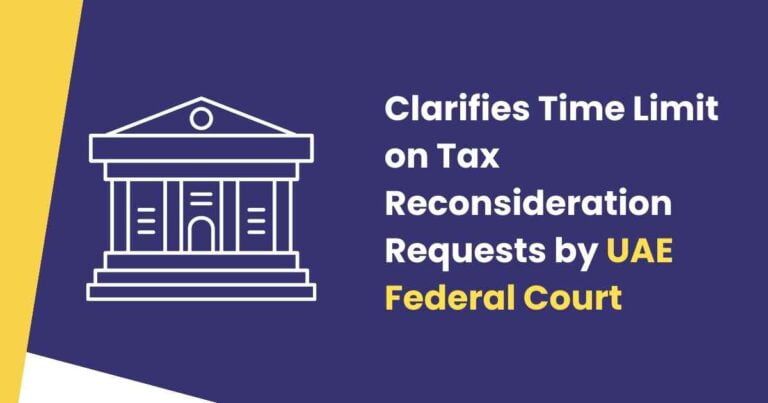Have you recently filed your taxes in the UAE and think you may have made a mistake? Wondering what to do if you want to change something on your tax return? Then this blog is for you! I’m going to explain in simple terms what a tax reconsideration is, and the new rules set by the Federal Court about time limits for reconsideration requests.
The main topics discussed here are:
- Tax reconsideration
- Federal Court ruling
- Deadline
- Documentation
- Common reasons for reconsideration
Let’s get started!
What is a Tax Reconsideration Request?
A tax reconsideration request is when you ask the tax authorities, like the Federal Tax Authority (FTA) in the UAE, to take another look at your tax return if you think you made a mistake. You can request changes to things like the amount of tax you owe or deductions you claimed.
Sometimes after filing taxes, people realize they missed claiming an important deduction or made a small calculation error. By submitting a reconsideration request, it gives the tax department a chance to re-evaluate your filing and make any necessary adjustments. This helps ensure taxpayers aren’t overpaying on their taxes.
The Previous Uncertainty Around Deadlines
In the past, there was some confusion around how long you had to submit a reconsideration request after filing your taxes. Different sources quoted different timeframes, from 30 days to 60 days or even 90 days.
Without a clear rule set out, taxpayers were left unsure about important deadlines. This meant some reconsideration requests may have been filed too late. People wanted more certainty on the exact timeframe for submitting requests to the FTA.
What the Federal Court Clarified
To resolve the ambiguity, in February 2022 the UAE Federal Court made an important ruling. It explicitly stated taxpayers now have 30 days to submit a request asking the FTA to reconsider their tax return.
This definitive deadline applies no matter when your tax filing date was. So for example, if you filed your taxes on April 1st, you would have until April 30th to request any corrections or amendments from the tax department.
The new fixed limit provided clarity that was lacking previously. Now both taxpayers and the FTA know reconsideration requests must be received within one month of the original tax filing date.
Common Reconsideration Scenarios
Some common reasons people submit reconsideration requests include:
- Missing a tax deduction they were eligible to claim such as work expenses
- Making a small calculation error on their return
- Forgetting to claim a tax credit they qualified for like child tax credits
- Overlooking income sources that should have been reported
Carefully reviewing your return within the 30 days can help ensure no mistakes were made. Requesting changes promptly avoids any potential penalties from filing inaccurately.
Some examples where reconsideration could apply include:
- Self-employed individuals who forgot to claim work-related travel expenses. Keeping good records of these costs allows reimbursement through the reconsideration process.
- Employees who changed jobs mid-year and had multiple employers withholding tax. If too much tax was withheld overall, reconsideration can help get an excess refund.
- Families who took in an elderly parent as a dependent but neglected to claim the additional dependent tax credit or deduction. Proving the dependency status and estimated support costs through receipts allows qualifying for these tax benefits upon reconsideration.
- Landlords who rental properties but underestimated qualifying renovation expenses or missed depreciation deductions. Detailed invoices substantiating maintenance, repair and upgrade costs as legitimate rental property expenses strengthens reconsideration requests.
- Business owners who incorrectly recorded income or expenses across different fiscal periods. With accounting statements showing the full-year financial details, recalculating the correct amounts per tax period becomes possible on reconsideration.
The key is to thoughtfully evaluate your particular tax situation and filings. Identifying overlooked information that is substantiated and could impact taxes paid or owed establishes strong grounds for a successful reconsideration request. Small errors adding up to hundreds or thousands in taxes mean the effort is worthwhile.
Some important tips when preparing reconsideration materials:
- Organize all documents chronologically to match the specific items addressed on tax forms. Clearly labeling receipts avoids confusion.
- Complete documentation covers all essential details like dates, vendor/client names, item descriptions and amounts. Scans come across clearly versus difficult-to-read photos.
- Calculations accompany any numerical adjustments requested, showing work. For deductions, specify relevant tax codes that allow the reduction amount claimed.
- Cover letters provide context. Explain the reason for reconsideration succinctly without duplication of forms or documents.
- Include current contact details in case additional information is necessary during FTA processing. Respond promptly to any inquiries for a timely resolution.
- Submit via registered mail or electronically for confirmation of receipt before the 30-day deadline through the FTA website. Avoid last-minute rushes.
Required Documentation
This Federal Court decision eliminated uncertainty regarding reconsideration deadlines while still giving taxpayers a reasonable window to address small errors or omissions. Some key effects of the new 30-day limit include:
- Clearer guidelines for both taxpayers and the tax authority on request timeframes
- Earlier identification of issues to avoid penalties from missed deadlines
- Prompt resolution of errors prevents taxpayers paying too much in taxes
- A consistent procedure is applied to all reconsideration submissions
Overall, it balances ensuring fair process with preventing late submissions. The more standardized approach also makes the tax system easier to navigate.
Conclusion
In summary, the Federal Court’s ruling established a standard 30-day period after your tax filing date to submit any necessary reconsideration requests to the FTA. Carefully review your return within this timeframe and provide complete documentation to justify any changes.
Following the formal process helps taxpayers correct issues promptly so taxes are paid accurately without facing late penalties. Though filing mistakes do happen, taking time to double check eliminates missed opportunities to request reconsideration after the deadline has passed.
FAQS
Tax reconsideration, Federal Court ruling, Deadline, Documentation, Common reasons for reconsideration.
You can fill out Form 200 and submit it online or by post along with your documents within 30 days of filing your original tax return.
You can appeal their decision to the Independent Tax Commission within 30 days of receiving the FTA’s response by providing additional evidence or reason for reconsideration.
The Federal Court has set a 60 day time limit for taxpayers to file a tax reconsideration request from the date of issuance of the tax assessment order.
The 60 day period starts from the day the taxpayer receives the official tax assessment order from the Federal Tax Authority.





